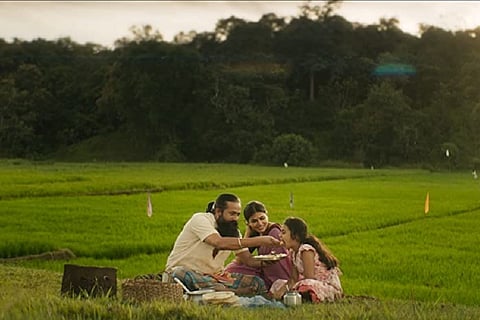

When a film contains not one, but multiple scenes of violence against women, one hopes that it's all in place for a bigger cause. These sequences are rarely warranted on screen, one might say, but filmmakers use them to showcase their penchant for a certain kind of ‘rawness’. We saw some of this rawness in the recent Shiva Rajkumar-starrer Vedha, wherein multiple crimes were inflicted on the film's female characters. There was at least a semblance of justification in that case, thanks to Vedha’s vigilante-justice narrative. But in debutant director Soora's Gowli, the same formula is used to evoke pitiful, knee-jerk reactions from the audience. Bereft of nuance or necessity, the film makes use of the crime-against-woman trope multiple times to generate fleeting sympathy in the viewer.The problem arises when you realise that the film has no intention to discuss the violence it displays. Instead, it uses the rural setting and its inherent patriarchy as lazy, unworthy justifications. Although these portions don't constitute much in terms of run time, their frivolous presence in the narrative must not go unchallenged.
At its heart, Gowli is a revenge story that uses a very specific, unexplored time and place as its backdrop. Gowli, the eponymous hero played by Srinagar Kitty, belongs to the marginalised community of cattle herders called Gowligas. His world comprises a large herd of cattle and a small family that includes his wife Girija (Pavana Gowda), daughter Puttavva, and a congenial uncle (Rangayana Raghu). If given a chance, he would never step beyond those tranquil confines.
But the world around him is unwilling to let him reside in peace. While the village drunks eye his cattle, the local sub-inspector Kalinga leches after his wife, Girija. When Girija rejects Kalinga's advances with a tight slap, he joins forces with the drunks and flips Gowli's pleasant life on its head by stealing all his cattle. An unintended retaliation to this puts Gowli, along with his uncle, on the run.
Soora, who is also the film’s writer, wants Gowli to rise from the ashes at this point and reveal his true grit. Gowli has been a submissive man so far, bullied for many years. There couldn't be a better time for him to throw off the shackles. To make things more delicate, a group of dacoits launches itself on his village, and his wife and daughter have become their prime targets. It's a Karnan-meets-Sam Peckinpah's Straw Dogs kind of setup, and Gowli has no option but to step up.
Just at that point, as though on cue, Soora drops the ball. Gowli's journey thus far had been quite intriguing, and everything from this point onward, if well executed, could have been the audience's main return-on-investment. But what he instead offers is an unending montage of slo-mo action sequences. While the trailer did suggest, more than subtly, that action and violence were major contributors to the ethos of Gowli, one hopes it had all come together under better circumstances. The context—a disparaged man unleashing his fury—was laid out very well, no doubt, but Soora falters big-time by caricaturing his villains. Be it SI Kalinga, the dacoits, or the local drunks, each of the villains is so over-the-top that their kitschy antagonism does not complement Gowli's justified anger in any way. The fights pan out predictably that even when the narrative throws up a shock or two, we aren't compelled enough to feel much.
Sharath Lohithashwa, who plays SI Kalinga, puts up an interesting, but overbearing performance, whereas the group of dacoits including Yash Shetty, Cockroach Sudhi, and others simply disappoint.
The film’s saving grace are the performances of Srinagar Kitty, Pavana Gowda, and Rangayana Raghu. The former two as a couple exude warmth and are believable on screen. With the help of the child actor, Soora manages to create tenderness. The approach for these scenes might seem a tad old-fashioned, but it is nevertheless effective. Rangayana Raghu, as the affable uncle, completes the picture. If only the threat that looms large amid them had some personality, Gowli would have been much more credible as a film.
There is a lot to savour in the film, especially its keenness to step away from the usual locales and use an unexplored part of North Karnataka as its main setting. Fascinatingly, Soora does not bother us with the exact details of the backdrop, but simply paints a picture of its uniqueness. Cinematographer Sandeep Valluri does the rest through his lens. With the help of a better script and finer editing, the film could have salvaged what it had put together in the first half. Sadly, the second half's inadequacies derail it. Still, Gowli is not completely unworthy of a visit to the theatre, but be prepared to stomach some disturbing sequences.
Disclaimer: This review was not paid for or commissioned by anyone associated with the film. Neither TNM nor any of its reviewers have any sort of business relationship with the film's producers or any other members of its cast and crew.